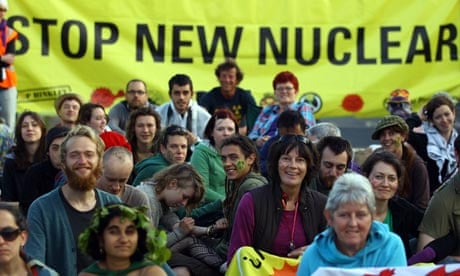The UK's "eccentric" determination to build new nuclear power means it is not fit to take part in the "third industrial revolution" of switching to clean renewable energy, according to one of the world's most influential climate scientists.
Prof John Schellnhuber, the current adviser to the German chancellor, Angela Merkel, and previous adviser the president of the European commission and other governments, said the UK was missing out owing to its failure to replicate the successful use of feed-in-tariffs (Fits) to kickstart its renewables industry.
Schellnhuber also said that the world's energy system could be transformed to a cleaner and cheaper renewable model for the same expenditure already paid out in subsidies to the fossil fuel industry.
In 2010, $409bn was given to the oil, gas and coal industry as subsidy, with just $66bn going to green energy.
In an interview with the Guardian, Schellnhuber, who heads the Potsdam Institute for Climate Impact Research in Germany, said the cost of transforming the infrastructure to run the world on renewable energy was roughly the same as current subsidies for carbon fuels. "The money is absolutely available," he said.
He added that, while up-front investment was needed to create the clean infrastructure, it would be much cheaper to run in the long term. "Renewables are by definition inexhaustable, so do not lead to the piling up of debts. They are also evenly spread: the wind is blowing almost everywhere, the sun is shining almost everywhere. In the end renewables are the quintessential democratic energy source," he said.
But he warned: "The world economy is still locked into the wrong paradigm." Energy costs are cut today by bequeathing debts to future generations, he said. "We are exploiting the future by using the atmosphere as a waste dump."
This was also the case for the broader economy, he said, where government spending today was dumped on future generations through national debt: "It is the very simple strategy of governments in the industrialised world to avoid social tensions by providing the so-called lower classes with benefits without taking the money from the rich. You maximise the benefit. It is the dictatorship of the present."
Schellnhuber said an international deal could not be done at the UN climate change talks, resuming on 28 November in Durban, South Africa, and where he will participate in a high-level policy discussion with the host president, Jacob Zuma, and others. But Schellnhuber said he was confident that the energy transformation was underway, with "pioneer" nations such as Germany and South Korea leading the way, probably followed by China.
"The German story is very encouraging," he said. The Fits and other policies had led to a "grassroots revolution on the energy supply". The big energy companies such as RWE and E.ON are asking themselves, "will anyone need us in 20 years' time", he said. In the UK, by comparison, the government is being taken to court after slashing subsidies for solar power by 50% with just six weeks' notice.
"Britain could have a very important role if it reconsidered the role of nuclear," Schellnhuber said. "I am a physicist and not afraid of nuclear power plants but if you factor in all the costs including nuclear waste treatment or dismantling a nuclear plant, it is the most expensive energy source. The myth of a low-cost, safer and easily manageable nuclear alternative [to renewables] is keeping the UK from becoming a member of the fitness club for the 21st century and a real partner for countries like Germany in the third industrial revolution."
A spokesman for the Department of Energy and Climate Change said: "Nuclear will have a role to play in our future energy mix – as it does today – but we've always said that will be as part of a portfolio approach, of which renewables and clean coal and gas will play a key role too." He highlighted a statement made by Chris Huhne in October: "We do what any rational investor does with their own pension fund – we spread our risks, we have a portfolio."
The end game for climate change and energy is this critical decade, he said, as there will then be evidence of large-scale clean energy in operation and the imperative to make sure emissions start declining globally by 2020. If the clean energy transformation happens fast enough, Schellnhuber believes the global temperature rise can be held to 2-3C. If not, a temperature rise of 5C by 2100 is likely, and more beyond, with impacts rated as catastrophic by scientists.
"My advice is to invest everything we have into a smart and sustainable energy system, despite the financial crisis," he concluded. "And almost as a side effect we will solve the climate crisis."
Last week, the International Energy Agency warned that unless major changes are made to plans for new fossil fuel power plants in the next five years, it will become impossible to hold global warming to a "safe" level of 2C.

Comments (…)
Sign in or create your Guardian account to join the discussion